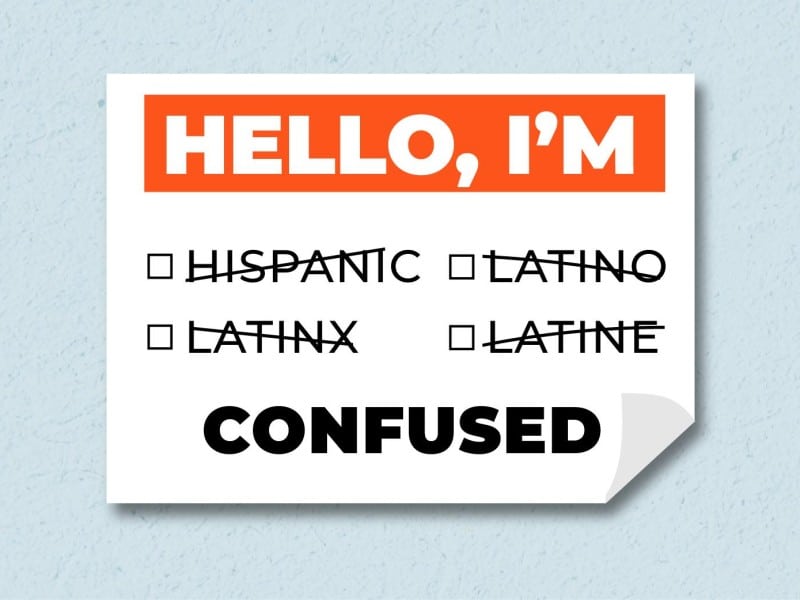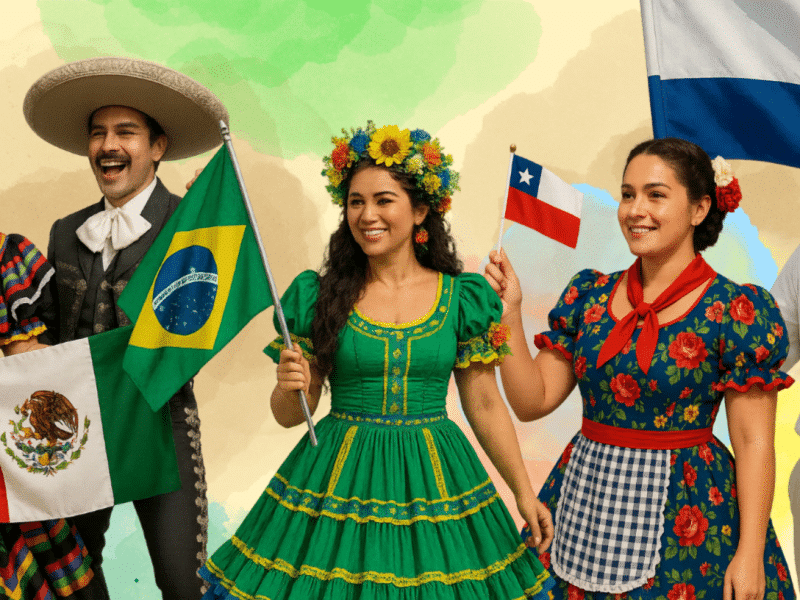Identity Labels 101: Hispanic, Latino, Latinx, and More
Hispanic Heritage Month has arrived, and just like every other year, everyone is still wondering how to refer to our community. We explore the Latino history of labels.

Identity labels are ever-illusive as they change through generations and as people struggle to identify with the categorcial boxes. The way people identify is constantly evolving and as long as people keep changing and expressing how they feel, the labels will change, especially in such a misunderstood and complex community like “Latinos.”
According to the Pew Research Center, 47% of Latinos identify with their country of origin, and 39% by Hispanic or Latino. When the vast majority of the Latine community identifies with personalized AND broad catch-all’s, how do most people figure out what race box to put themselves in? (and yes, at Luz Media we use all the terms interchangeably – we’re certainly not going to attempt to be the arbiter of this topic desmadroso!)
During this “Hispanic Heritage Month,” however, we can come together in community and identify however you think is most accurate and appropriate, and leave the judgment at home for how others also choose to identify. We’re looking at you, Latinx-haters.
Now without getting into the discussion of race, which is a whole PhD curriculum, we’re instead sticking to the superficial topic of identity labels that exist for Latinos, Latinx, Hispanic, and WHATEVER YOU CALL YOURSELF (and what non-Latinos call us).
Hispanic
Yeah, yeah, we know we’re tired of this label, and of course, it’s problematic because it highlights the language and, therefore, the heritage from Spain. Paloma Celis Carbajal states that the term Hispanic came to prominence in the late 1960s, and it wasn’t until 1980 that the term Hispanic first appeared on the U.S. Census. At least for a while, Hispanic was the go-to term when referring to people with heritage from Spanish-speaking countries in Latin America. It has since fallen out of favor for what was once considered the more “accurate” term for our community, “Latino.” Read on…
Latino
After the controversy of Hispanic, the Latino term arrived! Felicidades, mi gente! The already known and widely used term appeared in 1997, where, according to Carbajal, the Office of Management and Budget issued a directive adding the term Latino to government publications, and it appeared on the 2000s Census as Hispanic/Latino. It intends to be a catch-all for people with origins from all Latin-American countries, and a few Caribbean countries.
The problem? Not everyone is from Latin America – ummm, hello native Mexicans before the Mexican-American War, and is this when we talk about some Brazilians and other South Americans who don’t consider themselves Latino or Indigenous who opt to identify as White? The answer to the latter is absolutely not. Have that discussion on your own with an Argentinian in your life. Needless to say, the catch-all “Latino” has more holes in it than our old chanclas that we refuse to get rid of.
Latinx
A new term! It’s the gender-neutral version of Latino or Latina. It exists to be more inclusive and considerate of non-binary folks who are part of the Latinx community. It’s most often used amongst young, liberal, and college-educated Hispanics. Here at Luz Media, we like it because we like the spirit of it.
That being said, we get it. The main argument we often hear is that the term is an affront to the Spanish language, which is a gendered language. And dios guarde, we can’t change the basics of our mother tongue! Considering that Spanish is the language of colonizers and if the genocide of indigenous Latin-Americans had never happened, most of us non-Spanish people would be speaking local native languages and dialects, we don’t buy the “our Spanish is sacred” argument, but we do buy the argument and fact that the very vast majority of people simply do not identify this way. The Pew Research Center reports that 1 in 4 U.S. Hispanics are familiar with the Latinx label, but just 3% actually use it. They also report that young hispanic women the the most likely to use it.
Latinx is ironically often criticized for the same reason Hispanic fell from grace – the term is said to have originated from high-brow academia and the scholarly “woke” that has a largely U.S. and English-based construct, and therefore doesn’t really accurately represent the large population that includes first-generation immigrants.
The evolution of language takes time, and we’re open to waiting for the adoption of this one or the transition into the next one.
Latine
Speaking of which, wait no further, gente hermosa!! Latine has entered the building. Pronounced LAA-TIN-AYE, and as expected, all new terms are challenged, making Latinx no exception. Remember that Spanish language critique? Turns out a lot of people respect that critique, and to be the everlasting people of peace (that didn’t go well for our ancestors…), the term Latine can be more easily integrated into the pronunciation of Spanish. So now the gender-neutral term is pronounceable and usable within the confines of the Spanish language.
Latine might be the newest edition to the label game, and it seems to be one of the more accepted forms to address our gente. With Latine being a term easily pronounceable in Spanish, it looks like this term (though initially the underdog) is here to stay.
Chicano
But hold up, hold up. According to the 2019 U.S. Census Bureau population estimate, among Hispanic subgroups (their word, not ours), Mexicans made up the largest group at 61.4 percent. Following with: Puerto Ricans (9.6 percent), Central Americans (9.8 percent), South Americans (6.4 percent), and Cubans (3.9 percent). So we would be remiss if we didn’t mention the OG label, Chicano.
This label is used primarily in the Southwestern U.S. and amongst Mexicans. It’s a combination of Mexican and American and was used as a pejorative word at first. When Mexicans joined their Black brothers and sisters in the quest for Civil Rights in the 1960s, the term was proudly reclaimed in an effort to rid the word of its negative connotations. Wikipedia tells us it was Rodolfo “Corky” Gonzales, who was one of the first to reclaim the term.
In today’s quest to seek personal truth and proud identity, the term is experiencing a bit of a resurgence amongst newly minted young Chicano activists.
Afro-Latino
The term Afro-Latin@/x/e has recently emerged into widespread use as a response to the invisibility and intentional erasure of Latin-American and Caribbean people with African heritage. To further expand, Black Latinos is the label to account for Latinos who are mixed race, or don’t identify with the “afro” description. The rise in popularity of the terms has helped discuss and address the rampant anti-blackness and colorism within the Latino community both in our native Latin-American countries and at home in the United States.
These terms, specifically as it relates to Afro and Black Latinos, are evolving even faster than the rest because after being ignored and discriminated against for so long, the Afro-Latino community has a lot to say about their experience and identity. Rightly so, and we’re here for it.
We know our people will have something to say after this roundup. Did we miss any? (wasn’t intentional!) Don’t cuss us out. We’re just the messengers. Luz Media is run by Latinas, and we’re for Latinas, but in our coverage of topics and people, we go out of our way to refer to people the way they identify themselves. Don’t let this article give you high blood pressure; remember, at the end of the day, we’re all just people doing our best (most of us, anyway, some people actually do suck).




